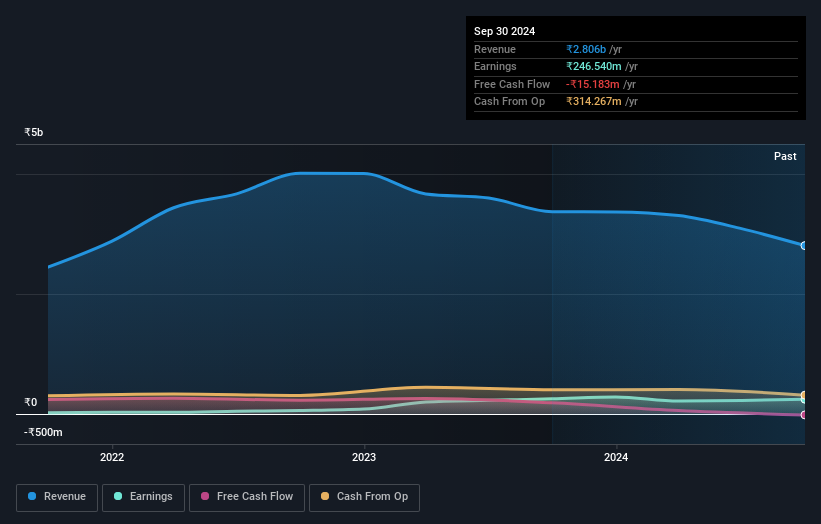- India
- /
- Metals and Mining
- /
- NSEI:SURAJLTD
Suraj Limited (NSE:SURAJLTD) adds ₹993m in market cap and insiders have a 79% stake in that gain
Key Insights
- Insiders appear to have a vested interest in Suraj's growth, as seen by their sizeable ownership
- A total of 4 investors have a majority stake in the company with 54% ownership
- Past performance of a company along with ownership data serve to give a strong idea about prospects for a business
To get a sense of who is truly in control of Suraj Limited (NSE:SURAJLTD), it is important to understand the ownership structure of the business. We can see that individual insiders own the lion's share in the company with 79% ownership. In other words, the group stands to gain the most (or lose the most) from their investment into the company.
As a result, insiders scored the highest last week as the company hit ₹9.2b market cap following a 12% gain in the stock.
Let's delve deeper into each type of owner of Suraj, beginning with the chart below.
Check out our latest analysis for Suraj

What Does The Lack Of Institutional Ownership Tell Us About Suraj?
Small companies that are not very actively traded often lack institutional investors, but it's less common to see large companies without them.
There are multiple explanations for why institutions don't own a stock. The most common is that the company is too small relative to funds under management, so the institution does not bother to look closely at the company. Alternatively, there might be something about the company that has kept institutional investors away. Suraj might not have the sort of past performance institutions are looking for, or perhaps they simply have not studied the business closely.

We note that hedge funds don't have a meaningful investment in Suraj. Anilaben Shah is currently the largest shareholder, with 19% of shares outstanding. With 16% and 13% of the shares outstanding respectively, Chandrikaben Shah and Rekhaben Shah are the second and third largest shareholders. Furthermore, CEO Kunal Shah is the owner of 5.6% of the company's shares.
Our research also brought to light the fact that roughly 54% of the company is controlled by the top 4 shareholders suggesting that these owners wield significant influence on the business.
While it makes sense to study institutional ownership data for a company, it also makes sense to study analyst sentiments to know which way the wind is blowing. Our information suggests that there isn't any analyst coverage of the stock, so it is probably little known.
Insider Ownership Of Suraj
The definition of company insiders can be subjective and does vary between jurisdictions. Our data reflects individual insiders, capturing board members at the very least. The company management answer to the board and the latter should represent the interests of shareholders. Notably, sometimes top-level managers are on the board themselves.
I generally consider insider ownership to be a good thing. However, on some occasions it makes it more difficult for other shareholders to hold the board accountable for decisions.
Our most recent data indicates that insiders own the majority of Suraj Limited. This means they can collectively make decisions for the company. So they have a ₹7.3b stake in this ₹9.2b business. Most would be pleased to see the board is investing alongside them. You may wish todiscover (for free) if they have been buying or selling.
General Public Ownership
With a 17% ownership, the general public, mostly comprising of individual investors, have some degree of sway over Suraj. While this group can't necessarily call the shots, it can certainly have a real influence on how the company is run.
Private Company Ownership
We can see that Private Companies own 3.7%, of the shares on issue. It might be worth looking deeper into this. If related parties, such as insiders, have an interest in one of these private companies, that should be disclosed in the annual report. Private companies may also have a strategic interest in the company.
Next Steps:
While it is well worth considering the different groups that own a company, there are other factors that are even more important. For example, we've discovered 1 warning sign for Suraj that you should be aware of before investing here.
Of course this may not be the best stock to buy. So take a peek at this free free list of interesting companies.
NB: Figures in this article are calculated using data from the last twelve months, which refer to the 12-month period ending on the last date of the month the financial statement is dated. This may not be consistent with full year annual report figures.
New: Manage All Your Stock Portfolios in One Place
We've created the ultimate portfolio companion for stock investors, and it's free.
• Connect an unlimited number of Portfolios and see your total in one currency
• Be alerted to new Warning Signs or Risks via email or mobile
• Track the Fair Value of your stocks
Have feedback on this article? Concerned about the content? Get in touch with us directly. Alternatively, email editorial-team (at) simplywallst.com.
This article by Simply Wall St is general in nature. We provide commentary based on historical data and analyst forecasts only using an unbiased methodology and our articles are not intended to be financial advice. It does not constitute a recommendation to buy or sell any stock, and does not take account of your objectives, or your financial situation. We aim to bring you long-term focused analysis driven by fundamental data. Note that our analysis may not factor in the latest price-sensitive company announcements or qualitative material. Simply Wall St has no position in any stocks mentioned.
About NSEI:SURAJLTD
Suraj
Manufactures and sells stainless steel seamless pipes, tubes, U tubes, flanges, and fittings in India.
Slight risk with mediocre balance sheet.
Market Insights
Community Narratives





